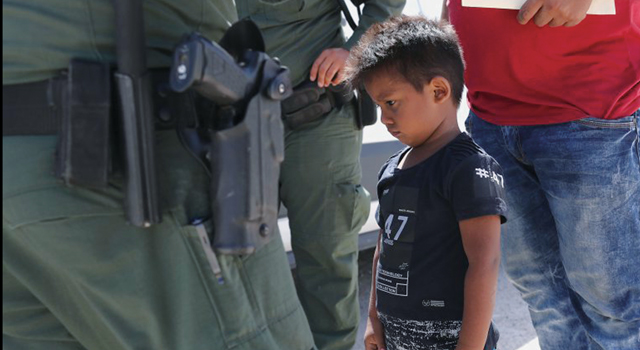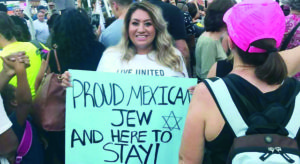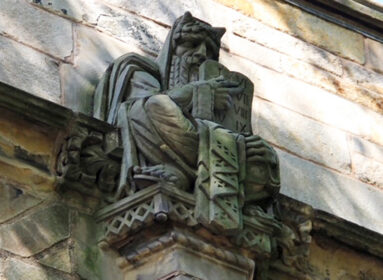
By Ben Sales
(JTA) — When Mary McCabe explains America’s immigration courts to children who have been separated from their parents, she tries to make it interactive.
She draws a sketch of a courtroom and asks kids to identify the figures in the room — like the judge or the lawyers — and where they sit. For younger ones, ages 6 or 7, she brings a box of crayons and a sketchpad for doodling. Older kids sometimes play with a toy that drips colored oil into water. Anything to give them a little diversion from her discussing why they are apart from their parents — and what happens next.
“I’ll bring along art supplies that they can use so when we talk, they don’t have to stare at me and talk. They can talk while they color,” said McCabe, an immigration attorney with HIAS Pennsylvania, an independent Jewish refugee aid organization that’s a separate partner of the national agency HIAS.
HIAS Pennsylvania is one of the Jewish groups actively aiding families that have been separated at the southern U.S. border under a new government policy dictating that every illegal migrant who crosses the United States border will be prosecuted and detained.
After President Donald Trump’s executive order on June 20 establishing that migrant families who cross the southern border illegally will be detained together indefinitely. U.S. Customs and Border Protection Commissioner Kevin McAleenan said he had “directed the temporary suspension of prosecutions for families in that category while we work through a process … where we can maintain family unity while enforcing prosecution efforts.” But more than 2,300 children, according to the New York Times, had already been forcibly separated from their parents, reclassified as unaccompanied minors and taken away, either to mass children’s shelters or foster homes.
Critics of the policy say forcibly separating parents and children indefinitely is traumatizing and draconian. Government officials — like President Donald Trump and Attorney General Jeff Sessions — say it’s a necessary measure to enforce border security.
On Tuesday, Sessions called comparisons of family separation to Nazi actions “a real exaggeration.”
McCabe and her colleagues have counseled a dozen separated children now living in a shelter in Pennsylvania about their legal rights, the process of seeking asylum and how they may be able to see their parents again. She has counseled children ranging in age from 6 to 15.
“One 7-year-old girl said, ‘My mom can’t talk to me, she doesn’t have a phone now, she can’t talk to me,’” McCabe recalled. “Some of the older ones are also really suffering. … They were fleeing gang or domestic violence, and they often came with their parent because their parent was also afraid. A lot of times the older kid is afraid the parent will be deported.”
A broad spectrum of Jewish groups have spoken out against the policy, along with many other religious organizations. Hundreds of organizations are planning to participate in a “Mass Mobilization” on June 30 in support of the Families Belong Together Coalition, with events expected across the country, including numerous towns in Connecticut. Some Jews, on the southern border and elsewhere, are working to provide physical or legal assistance to migrants, or to organize other local Jews to speak up.
“Obviously Jews had a history of immigration and of moving when sometimes they haven’t wanted to, and having to find places where they’re welcome,” Mayor Jonathan Rothschild of Tucson, Arizona, told JTA. His city is 60 miles from the border.
“There’s also a moral faith that follows religion,” the Jewish lawmaker said. “You can’t but have your stomach turned by the stories that we hear.”
Last week, 27 Jewish groups — including, in a rare show of unanimity, the leadership of all four major American Jewish religious movements — signed an open letter to Sessions decrying the policy, saying it “undermines the values of our nation and jeopardizes the safety and well-being of thousands of people.”
“I haven’t seen anything like this in this field since the first executive order came out,” said Mark Hetfield, president of the national HIAS organization, referring to the January 2017 travel ban on seven Muslim countries. Nearly all major American Jewish groups opposed that policy as well.
Rothschild, a Democrat, said that because family separation is a result of federal policy, there is not much he can do directly as Tucson’s mayor to hinder it. But he signed a joint letter this month with the mayors of Los Angeles, Houston and Albuquerque, New Mexico, calling the policy “cruel,” “morally reprehensible” and “utterly inconsistent with our values of decency and compassion.”
Although Arizona as a state has a history of strict immigration legislation, Rothschild says his constituents largely oppose the family separation policy.
“We have a community where so many people have friends, family and relatives who live on both sides of the border,” he said. “In Tucson, the overwhelming consensus is that these are bad policies.”
One of Rothschild’s constituents is Alma Hernandez, a Mexican-American Jewish woman running this year for the Arizona House of Representatives.
Not all local activism in the protection of immigrants involves working against the government. Bob Feinman, a New York City transplant and retired longtime broadcaster on Tuscon’s Spanish-language radio, is vice chair of Humane Borders, which places water tanks near the border so that migrants don’t die of dehydration after they cross over.
The group works with border security forces to ensure that its tanks can be installed and maintained in the most useful locations. Humane Borders also urges families south of the border not to cross illegally due to the dangers that may await them in the United States — including family separation.
Speaking personally, Feinman said he is “shocked beyond belief” by the policy.
“We can agree to disagree with them on certain matters and still save lives,” he said.
Regarding potential migrants, he added, “We beg and plead with them to talk people out of crossing the border illegally. The stories they get about how easy it is are false.
We try to convey to them that it is not worth the risk, whether it’s over a regular border crossing or through the desert.”
McCabe said that she understands the decision to take the risk to cross the border after hearing stories of the gangs and violence that threaten families in Central America. She says working for a Jewish organization has made her even more aware of the need to provide a safe haven to families seeking asylum.
“What happened in the 1930s and ‘40s has had an impact on our asylum system,” she said. “That’s partly why we have this asylum system. The Jewish community cares that people who are being targeted for persecution have a way to be safe because people died. I feel like I’m just stating the obvious.”
Hundreds of Jews protest at ICE headquarters in New York City
By Ben Sales
NEW YORK (JTA) — Hundreds of Jews crowded the steps of the New York City headquarters of Immigration and Customs Enforcement to protest the government’s policy of separating families at the southern border.
Jewish texts and liturgy imbued the protest organized by T’ruah, the liberal rabbinic human rights group, and Jews for Racial and Economic Justice. It was co-sponsored by 30 organizations, including congregations and liberal Jewish activist groups.
Speakers included Rabbi Shai Held, co-founder of the traditional egalitarian Hadar Institute and an essayist who often connects biblical themes to current events, and Brad Lander, a Democratic city councilman from Brooklyn with a large Jewish constituency who has allied with liberal Jewish groups. Both condemned the Trump administration in Jewish moral terms.
Held cited a Talmudic passage that says the sounds of the shofar during the High Holidays represent the cries of a mother searching for her son Sisera, a missing Canaanite general in the book of Judges.
“In the most solemn moment of the year, we are asked to learn to listen to the cries of parents who do not know where their children are or whether they will ever see them again,” Held said. “That’s not contemporary liberalism. That’s fundamental Jewish liturgy.”
President Donald Trump issued an executive order Wednesday establishing that migrant families who cross the southern border illegally will be detained together indefinitely. But the speakers at the rally condemned the administration for that decision as well, and for not reuniting the approximately 2,300 children who have been forcibly separated from their parents.
“When children and families are put in cages and in camps, our history requires that we show up and say, when we said ‘Never again,’ we meant ‘Never again,’” Lander said, referring to the Holocaust remembrance slogan. “We are required to show up when xenophobia and Islamophobia and racism and white supremacy and anti-Semitism become the policies of our country.”
The protest began with a new take on the traditional Jewish prayer for travelers, and ended with a recitation in song of the Jewish priestly blessing. During that prayer, protest leaders gathered the children in attendance under a spread-out prayer shawl. Throughout, people held signs reading “This is what ‘Never Again’ looks like” and “Don’t stand by the blood of your neighbor,” a quote from Leviticus.
A member of the militant right-wing Jewish Defense League led a handful of counterprotesters nearby.
Meet the millennial Mexican-American Jewish woman running for office on the southern border
By Ben Sales

Alma Hernandez at a protest in Arizona against the policies of President Donald Trump. (Courtesy of Hernandez)
(JTA) — Less than one day after Alma Hernandez began a Jewish fundraiser for migrants on the southern border, she had an SUV full of food, diapers and hygienic products ready to donate.
Hernandez loaded the vehicle with goods bought with donations on Wednesday afternoon. The following day she would drive them all down to a migrant shelter in Nogales, Mexico, on behalf of Tucson Jews for Justice, a progressive activist group she co-founded in March.
Hernandez, 25, is not the only Jew trying to help families crossing the border. But for her, the work is personal. Hernandez’s mother is from Nogales, a city adjacent to the border that serves as a gateway into the United States. When she talks about undocumented immigrants, in some cases she’s talking about her own relatives.
“I have family members who are here undocumented or as Dreamers, so any time I see things going on, it affects me and it hurts,” she told JTA, using an acronym that refers to undocumented immigrants who entered the country as minors. “As the Jewish community and as Jews, we should be the first ones saying anything.”
Despite her young age, Hernandez has gone through an eventful personal and professional journey to becoming a Jewish Latina activist who places both of those identities at the center of her work. Now she’s trying to break another barrier — running for state representative in a district representing part of Tucson, the Arizona city 60 miles from the Mexican border. If she wins, she will be the first Hispanic Jewish woman to hold elected office in the state, if not the country.

Alma Hernandez with her family at a ceremony in which she was given a Hebrew name after converting to Judaism. (Courtesy of Hernandez)
“When it came to issues like immigration, when it came to issues like refugees, I can give my opinion and come at it with a different perspective because as a Jewish Latina and the daughter of an immigrant coming from Mexico, I can share perspectives, experiences from my family,” she said. “It’s a great opportunity for me to build those relationships within the Hispanic and Latino community, and also introduce to members of the Jewish community.”
Just like Hernandez can help local Jews connect to their Latino neighbors, she has reassured Latino acquaintances that local Jews support their fight against strict measures on the border — including the recent family separations.
But she would like to see the established Jewish community become more active in the fight. Part of the reason she founded Tucson Jews for Justice, she said, was because she saw a need for a Jewish channel for progressive activism outside of mainstream organizations.
“We are immigrants, too, and it’s hurtful when I don’t see the Jewish community standing up and saying anything,” she said. “I understand a lot of times it’s the political aspect of it. We don’t want to piss anyone off and we want to stay neutral. But I think there are times when we can’t afford to stay neutral. And there are times we have to stand up and say this isn’t right.”
Born to a nonreligious family in Tucson, with a Jewish maternal grandfather, Hernandez began embracing her Jewish heritage in high school. She felt at home at Jewish services, and her second job was working with adults with special needs at the local Jewish community center. Attending college at the University of Arizona, she was active at Hillel and served as president of the campus pro-Israel club. She connects to Judaism’s imperative to pursue social justice.
In 2015, she made it official, converting at Congregation Chaverim, the local Reform synagogue. She had an adult bat mitzvah ceremony two years ago.
“I felt like helping others and uplifting other people was something I really, truly cared about,” she said. “I kind of felt also like I was honoring my family’s history. I felt like it was something that was special to me. My mom cried a lot. She was very emotional about it.”
Beyond being supportive of the process, her family has eagerly participated — sometimes to her surprise. When her parents said they would host a ceremony celebrating her adoption of a Hebrew name, Malka, she expected an intimate affair. Some 100 people showed up.
“My dad told me if I want to start something, I have to finish it,” she said regarding the conversion. “In Hispanic culture, we’re very big on celebrations and parties, so of course everything was always a big party.”
Politics is also a family affair. Hernandez first became involved in local campaigns as a teenager, when her older brother, Daniel, took her to volunteer for Terry Goddard, the 2010 Democratic nominee for governor. The next year, Daniel was the young intern credited with saving Rep. Gabby Giffords’ life when she was wounded in a mass shooting.
He applied pressure to her wounds until paramedics came.
This year, Hernandez and her two siblings are running for office. She is running for the Democratic nomination to an open Arizona House of Representatives seat in the 3rd District. Daniel is running for re-election as state representative in the 2nd District. And Consuelo, the middle child, is running for a local school board.
Hernandez comes off — at least on the phone — as effusive and energetic. But the experience that drove her to a political career was traumatic. When she was a high school freshman, two older students began making fun of her sister’s hair and then fighting with her. Hernandez recalls that police who were on campus interceded and slammed her to the ground, causing long-term damage to her spine, back and nerves. She now gets treated in the hospital several times a year.
“One day I was an honors student, the next day I was a criminal,” she said. “If that wouldn’t have happened, I probably wouldn’t have been as involved or as passionate as I am now. The only way to change what happened to me is to stay involved.”
Hernandez has a surprisingly broad range of experience for a 25-year-old. She has served as campaign manager in races for state representative and county attorney; senior organizer for Arizonans Unite for Healthcare, which helped people access Obamacare; and as a delegate for Hillary Clinton at the 2016 Democratic National Convention. She also went on short-term missions to Ghana and Panama in 2012 and 2014, respectively, to provide medical care to rural areas.
Before announcing her run for office, and while she was earning a master’s degree in public health, Hernandez served as the coordinator of Tucson’s Jewish Community Relations Council, which acts as the local Jewish voice on political policy. And she’s been active with both the Anti-Defamation League and AIPAC, the pro-Israel lobby.
“Alma is an inspiration on so many levels,” said Stuart Mellan, the president of the local Jewish federation. “As an individual, she’s a powerful young woman. … If at any one time you ask her what she’s doing, she’ll give you a list of three full-time jobs.”
As a self-identified progressive, Hernandez says she gets the most flak for being pro-Israel. But she still embraces the fight, writing an unapologetic letter this month defending Israel’s recent actions amid clashes on the Gaza border.
“They want us to choose: You’re either pro-Israel or pro-Palestinian, and it’s very difficult,” she said, referring to herself and her siblings. “We consider ourselves progressives. We care about everyone, and it’s a very difficult time right now to be someone who stands up for both.”








 Southern New England Jewish Ledger
Southern New England Jewish Ledger









